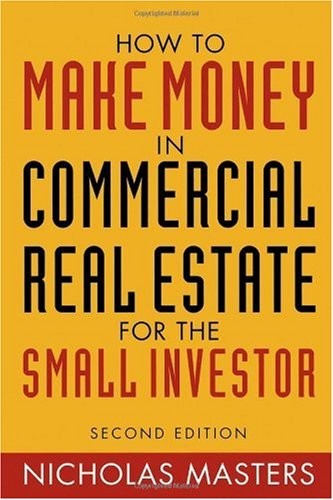How to Make Money in Commercial Real Estate
Post on: 30 Май, 2015 No Comment

by James A. Randel
You want to start investing in commercial real estate. But how do you avoid the money pits and find the true gems? In this excerpt from Confessions of a Real Estate Entrepreneur, get advice on what to do before you make your first purchase.
Confessions of a Real Estate Entrepreneur. What It Takes to Win in High-Stakes Commercial Real Estate
by James A. Randel
ISBN: 0071467939
Publisher: McGraw-Hill
Buy this book from Amazon.com
Let’s start with how NOT to make money: jump right in.
That’s right, if you are not willing to do some amount of homework in advance, you stand a good chance of making a dumb deal.
Commercial real estate investment is not brain surgery by any stretch. It is not high-tech and you do not need years of training to be successful. But, you do need some amount of preparation and education and here are my suggestions:
1. Read as many books on the subject as you can. needless to say, I recommend my own personal story: CONFESSIONS OF A REAL ESTATE ENTREPRENEUR. But, there are many good books on the subject.
2. Decide on a game plan. How much capital do you have to invest with? Remember that there is a risk-reward quotient to real estate investing and you need to ask yourself how much money you are willing to lose if all does not go according to plan. Do you know your borrowing power? Real estate investing is a leverage business — so, you need to speak with some bankers and get a sense of what amount of borrowed capital you can count on. What kind of deals interest you? Do you have any particular strengths or weaknesses that would lead you to one type of deal over another? Do you have any contacts in the business or, people who can mentor you? In other words, identify a realistic strategy that you wish to pursue.
3. Learn the market. Real estate investing is inextricably tied to specific geographic market information. Once you decide on the type of deal you want to pursue, select an area in which you wish to engage. Then, learn everything you can about this area and in particular information that will be important to the success of your game plan. For example, perhaps you have decided to pursue a small strip shopping center in the County in which you live. Begin the process of educating yourself about the market by speaking with every retailer who will talk to you. What rent are they paying? Is it gross (all expenses included) or net (in addition to base rent they pay the landlord’s expenses of ownership)? Do they like their location and why? What about their landlord is good/bad? And speak with every appraiser, banker, broker, consultant, developer, investor, lawyer and mortgage broker who will take the time, and who may have information on retail deals in the area. In just a couple of weeks you can learn a tremendous amount about what is going on in the small retail strip world where you live.

4. Consider how you are going to ADD VALUE to your acquisition of a commercial real estate property. In my book I outline my approach to investing — adding value to the process of acquiring real estate by attempting to tip the odds in your favor. And then, adding value to the real estate itself by seeking to address factors that may be artificially depressing the value of a property. Here is an example of each:
1) One way to add value to the process of acquiring real estate is to use language in the Contract of Sale which gives you control of a property for some period of time, while you have little if any money at risk. You have probably heard about contingencies, the most common example being a mortgage contingency. But, there are many other types of contingencies that can help you. A real estate investor needs to know how to deploy these tools to assist in the manipulation of his/her risk-reward equation.
2) After a commercial real estate property has been acquired, the game is to attempt to boost its value by some multiple of the capital needed to achieve the upgrade. The most common example is a property that is not as attractive as it should be. Many years ago my partner and I purchased a small office building behind a busy strip shopping center. The entrance to the office building was directly behind a restaurant in the shopping center and at the exact spot where the restaurant kept its garbage bins. As a result during the day visitors to the office building were walking past bags of food and other trash with usual less-than-pleasant sights and smells. The owner of the office building before us had owned it for years and had grown immune to the fact that this situation was depressing the rental values in his building. So, we invested about $15,000 in erecting a landscape barrier (pine trees) shielding the office building from the restaurant. That and other cosmetic changes, e.g. new paint, new front door, new windows (total investment of about $75,000) created several hundred thousand dollars in added value to the office building.
5. Develop sources of deal flow. Most commercial real estate investors look to real estate brokers to help them find properties to purchase. A good real estate broker is in the street 24-7 and knows what is or may be for sale. If you are just beginning in the business, it will not be easy to convince a broker to show you properties. Brokers only get paid when a deal closes and they must be convinced that you are a closer. But, with time and an understanding of what brokers want to hear (e.g. I have the capital lined up and I have been researching the market for two months now), you can convince brokers to begin bringing you property to purchase.
6. Take Action. Notwithstanding my advice above that you need to prepare before jumping in, at some point you do actually have to jump in. A commercial real estate investor has to be entrepreneurial and that means having a certain amount of optimism that he/she can deal with whatever hurdles will arise. Too many potential investors fail to act, or act quickly enough, because they wait until they have every possible scenario thought through and covered. That just won’t work. Yes, you have to think through as many possibilities as you can and what to do if this or that happened, but sooner or later you need to move forward — with the belief that whatever is thrown at you, you will be able to handle it.
So, good luck. if you are just venturing into commercial real estate, you are entering an exciting, challenging and potentially very lucrative field.
Buy this book from Amazon.com














